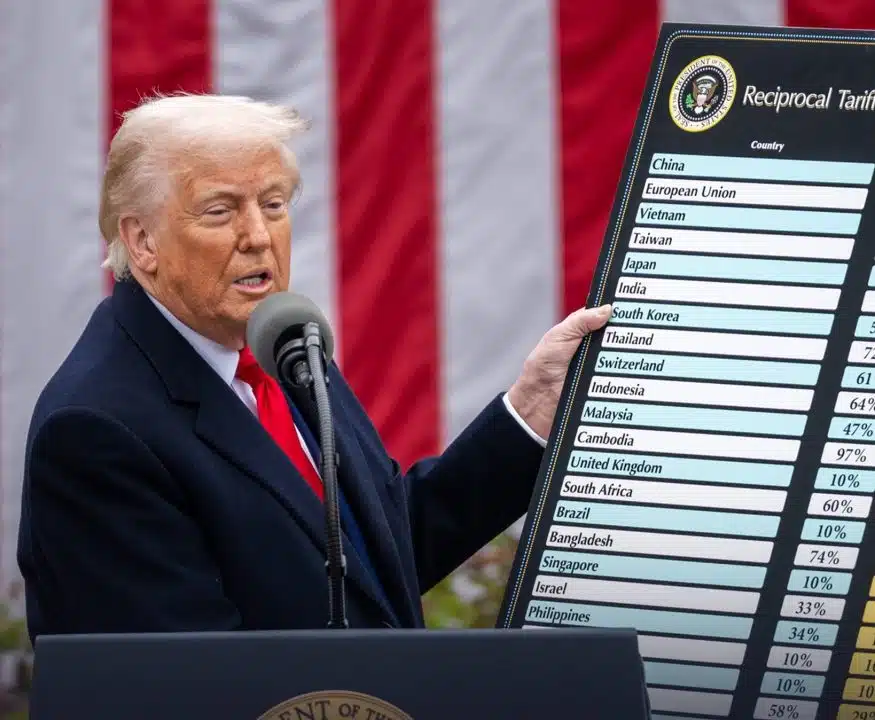Jaguar Land Rover has paused vehicle exports to the U.S., triggering renewed fears of widespread disruption in global markets as President Trump’s 25% car tariffs take effect. The move adds to growing volatility across the automotive, retail, and manufacturing sectors, underscoring the broader economic implications of the administration’s aggressive trade policy.

Jaguar Land Rover Freezes U.S. Shipments Over Trade Uncertainty
In a move that captured Wall Street’s attention, Jaguar Land Rover (JLR) announced a one-month pause in U.S. exports as it assesses the impact of the newly imposed 25% tariffs on imported cars. The company, one of the U.K.’s largest automakers, called the U.S. “an important market” and cited the need to “develop mid- to long-term plans” under the new trade regime.
This marks one of the first major corporate reactions to the Trump administration’s sweeping tariff measures, which also target steel, aluminum, and imported auto parts.
Trade Turbulence Hits Multiple Industries
The tariff shockwave is far-reaching:
- Stellantis (Jeep, Dodge, RAM) halted North American production at select plants, laying off 900 U.S. workers.
- Hyundai and Toyota report a spike in U.S. sales as consumers rush to beat expected price hikes.
- BMW and Ferrari are temporarily absorbing added costs, but only for select models.
- Ford and Nissan are cutting prices or offering aggressive incentives to maintain demand.
According to Cox Automotive, vehicle prices could rise:
- 10–15% for tariff-affected imports
- 5% for U.S.-assembled cars dependent on foreign parts
“No matter where they are made, car prices will go up,” said auto analyst Mel Yu.
Retail & Apparel Giants Also Brace for Impact
The ripple effects are not limited to automakers. Trump’s tariff policy extends deep into retail and consumer goods, targeting fashion, footwear, and textiles:
- Sneakers, jeans, and children’s clothing face tariff hikes as high as 54%.
- Major brands like Nike, Gap Inc., and Lululemon—which source heavily from Asia—warn of cost increases passed to consumers.
- Steve Madden is slashing Chinese imports by 45%, shifting production to Vietnam and Mexico.
The American Apparel & Footwear Association predicts:
- Work boots could rise from $77 to $115
- Children’s shoes could increase from $26 to $41
Supply Chain Strain: A New Era of Cost Realignment
Industry experts note that the globalization of supply chains—especially in autos and retail—makes it difficult for U.S. companies to quickly pivot. Many components, materials, and finished goods simply aren’t produced domestically.
“These materials don’t exist here, and never have,” said a footwear industry group in a letter to the U.S. Trade Representative.
The auto industry is particularly vulnerable. Between 40%–80% of U.S.-assembled cars use imported parts—many now subject to tariffs starting May 3. That cost will likely be passed on to consumers, further inflating vehicle prices and reducing demand.
Winners and Losers: A Business Realignment in Motion
A Barclays report highlights who stands to gain or lose:
Winners:
- Retailers with limited Asian sourcing and strong supplier leverage
- TJX Companies (T.J. Maxx), Ross, Burlington, Ralph Lauren
Losers:
- Brands with high exposure to Asia and limited pricing flexibility
- Gap Inc., Urban Outfitters, American Eagle
Secondhand retailers like ThredUp praised the tariff elimination on duty-free imports, saying it may curb “overproduction and environmental damage” in fast fashion.
Final Take: Market Volatility Is the New Normal
From automakers to apparel giants, companies are adjusting strategies in real-time. The overarching themes?
- Cost pressure is rising fast
- Supply chains are under stress
- Consumers will likely bear the brunt
As Jaguar Land Rover recalibrates, and others brace for further fallout, one thing is clear: in today’s economic landscape, trade policy is business strategy.
